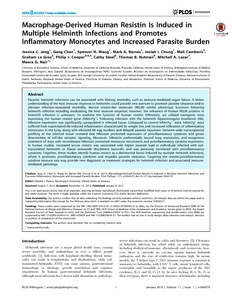Jang, JC;
Chen, G;
Wang, SH;
Barnes, MA;
Chung, JI;
Camberis, M;
Le Gros, G;
Cooper, PJ;
Steel, C;
Nutman, TB;
et al.
Jang, JC; Chen, G; Wang, SH; Barnes, MA; Chung, JI; Camberis, M; Le Gros, G; Cooper, PJ; Steel, C; Nutman, TB; Lazar, MA; Nair, MG
(2015)
Macrophage-derived human resistin is induced in multiple helminth infections and promotes inflammatory monocytes and increased parasite burden.
PLoS Pathogens, 11 (1).
e1004579.
ISSN 1553-7374
https://doi.org/10.1371/journal.ppat.1004579
SGUL Authors: Cooper, Philip John
![[img]](https://openaccess.sgul.ac.uk/107354/1.hassmallThumbnailVersion/Macrophage_derived_human_resistin_induced_multiple_helminth_inflammatory_monocytes.pdf)  Preview |
|
["document_typename_application/pdf; charset=binary" not defined]
Published Version
Download (1MB)
| Preview
|
Abstract
Parasitic helminth infections can be associated with lifelong morbidity such as immune-mediated organ failure. A better understanding of the host immune response to helminths could provide new avenues to promote parasite clearance and/or alleviate infection-associated morbidity. Murine resistin-like molecules (RELM) exhibit pleiotropic functions following helminth infection including modulating the host immune response; however, the relevance of human RELM proteins in helminth infection is unknown. To examine the function of human resistin (hResistin), we utilized transgenic mice expressing the human resistin gene (hRetnTg+). Following infection with the helminth Nippostrongylus brasiliensis (Nb), hResistin expression was significantly upregulated in infected tissue. Compared to control hRetnTg- mice, hRetnTg+ mice suffered from exacerbated Nb-induced inflammation characterized by weight loss and increased infiltration of inflammatory monocytes in the lung, along with elevated Nb egg burdens and delayed parasite expulsion. Genome-wide transcriptional profiling of the infected tissue revealed that hResistin promoted expression of proinflammatory cytokines and genes downstream of toll-like receptor signaling. Moreover, hResistin preferentially bound lung monocytes, and exogenous treatment of mice with recombinant hResistin promoted monocyte recruitment and proinflammatory cytokine expression. In human studies, increased serum resistin was associated with higher parasite load in individuals infected with soil-transmitted helminths or filarial nematode Wuchereria bancrofti, and was positively correlated with proinflammatory cytokines. Together, these studies identify human resistin as a detrimental factor induced by multiple helminth infections, where it promotes proinflammatory cytokines and impedes parasite clearance. Targeting the resistin/proinflammatory cytokine immune axis may provide new diagnostic or treatment strategies for helminth infection and associated immune-mediated pathology.
| Item Type: |
Article
|
| Additional Information: |
This is an open-access article, free of all copyright, and may be freely reproduced, distributed, transmitted, modified, built upon, or otherwise used by anyone for any lawful purpose. The work is made available under the Creative Commons CC0 public domain dedication. |
| Keywords: |
Virology, 0605 Microbiology, 1107 Immunology, 1108 Medical Microbiology |
| SGUL Research Institute / Research Centre: |
Academic Structure > Infection and Immunity Research Institute (INII) |
| Journal or Publication Title: |
PLoS Pathogens |
| ISSN: |
1553-7374 |
| Language: |
eng |
| Projects: |
| Project ID | Funder | Funder ID |
|---|
| R01 AI091759 | NIAID NIH HHS | UNSPECIFIED |
|
| PubMed ID: |
25568944 |
| Dates: |
| Date |
Event |
| 2015-01-08 |
Published |
|
 |
Go to PubMed abstract |
| URI: |
https://openaccess.sgul.ac.uk/id/eprint/107354 |
| Publisher's version: |
https://doi.org/10.1371/journal.ppat.1004579 |
Statistics
Item downloaded times since 05 Mar 2015.
Actions (login required)
 |
Edit Item |



